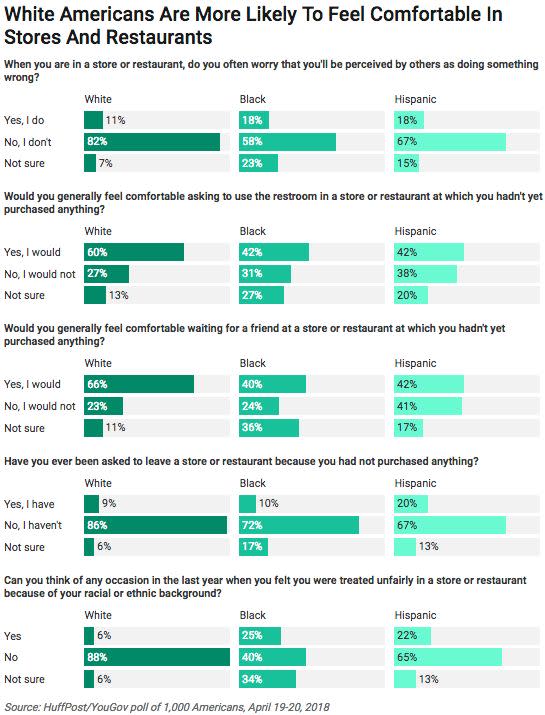White Americans Say The Starbucks Arrests Were An Isolated Incident. Black Americans Say They Were Part Of A Pattern.
White Americans who’ve been following the arrest of two black men at a Philadelphia Starbucks are most likely to think the story represents an isolated occurrence, according to a new HuffPost/YouGov survey. Black Americans see it as part of a pattern.
The vast majority of those surveyed had heard at least a little about the arrests. Among those, 48 percent of white Americans said it was an isolated incident, a third that it was emblematic of a broader pattern in how society as a whole treats black people, and 6 percent that it was a reflection of a broader pattern in the way Starbucks treats black people.
A 57 percent majority of black Americans, by contrast, saw the controversy as rooted in broader societal problems, with 19 percent considering it primarily an indictment of Starbucks, and just a tenth believing it was an isolated incident.
Reactions to Starbucks’ handling of the event are mixed among those who’ve been following the story, with 53 percent approving of the coffee chain’s handling of the aftermath and 47 percent disapproving. A 40 percent plurality said Starbucks was doing about the right amount to respond to the controversy, with about a quarter saying it was doing too much, and 18 percent that it was doing too little. Responses were about evenly split on whether closing stores for anti-bias training would be effective or not.
Black and white Americans gave Starbucks nearly identical approval ratings for their overall handling of the incident. But three in 10 white Americans said Starbucks was doing too much to address the controversy, while just 4 percent of black Americans said the same.
As is often the case in recent polls, the divides along political lines are even starker than the splits between races. A 69 percent majority of Hillary Clinton voters who’d heard about the Starbucks story said it represents a broader societal pattern, while just 9 percent of President Donald Trump’s supporters said the same. Slightly more than half of Trump voters, and just a tenth of Clinton voters, thought Starbucks was doing too much in response. Clinton voters were also more than twice as likely as Trump voters to believe anti-bias training would be effective.
Use the widget below to further explore the results of the HuffPost/YouGov survey, using the menu at the top to select survey questions and the buttons at the bottom to filter the data by subgroups:

The racial disparities in Americans’ own experiences in semi-public spaces like restaurants and stores, the rest of the survey finds, aren’t limited to Starbucks.
Most Americans, regardless of race, say they don’t often worry about being perceived as doing something wrong while out at a restaurant or store. But white Americans are 24 points likelier than black Americans to say they don’t worry about being suspected of wrongdoing in public, 18 points likelier to say they’d be comfortable using a restroom without buying anything and 26 points likelier to say they’d be comfortable waiting for a friend without making a purchase. The gaps between white and Hispanic Americans on those questions are 15 points, 18 points and 24 points, respectively.

The HuffPost/YouGov poll consisted of 1,000 completed interviews conducted April 19-20 among U.S. adults using a sample selected from YouGov’s opt-in online panel to match the demographics and other characteristics of the adult U.S. population.
HuffPost has teamed up with YouGov to conduct daily opinion polls. You can learn more about this project and take part in YouGov’s nationally representative opinion polling. More details on the polls’ methodology are available here.
Most surveys report a margin of error that represents some, but not all, potential survey errors. YouGov’s reports include a model-based margin of error, which rests on a specific set of statistical assumptions about the selected sample rather than the standard methodology for random probability sampling. If these assumptions are wrong, the model-based margin of error may also be inaccurate. Click here for a more detailed explanation of the model-based margin of error.
Love HuffPost? Become a founding member of HuffPost Plus today.
This article originally appeared on HuffPost.

